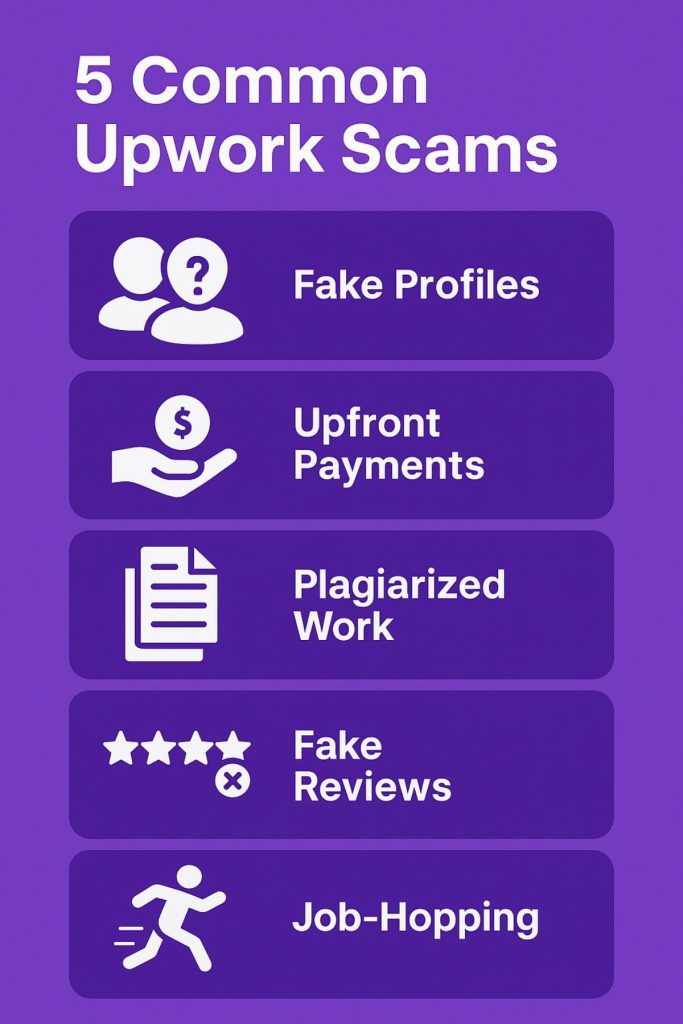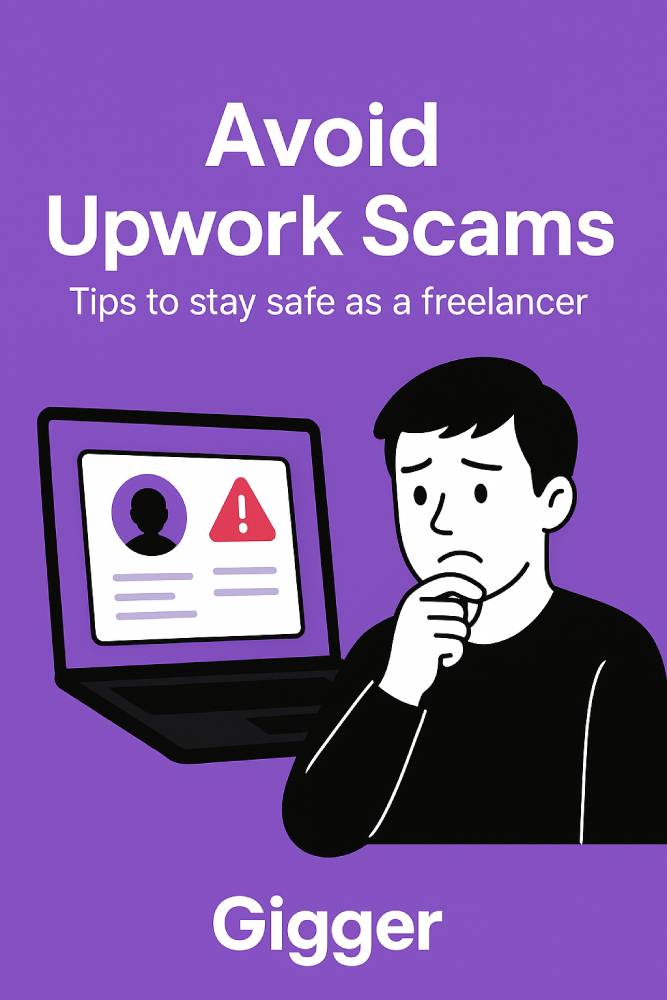Upwork is a leading freelancer platform that offers countless opportunities to work with global clients. However, like any online marketplace, it’s not free from scams.
Upwork scammers create fake job posts to deceive freelancers. They might ask for free work, steal personal information, or send fake payments.
As a freelancer, it is important to recognize the red flags and protect yourself. In this article, we’ll share practical tips and insights to help you avoid scams on Upwork and enjoy a secure freelance journey.
Is Upwork Safe for Freelancers and Clients?
Upwork has earned a reputation as a legitimate platform with a strong verification system and reviews. However, as with any online marketplace, questions about its safety and legitimacy often arise. Is Upwork legit and safe for both freelancers and clients read on Gigger blog?

For Clients
Yes, Upwork is a great place to find talented freelancers. Many skilled professionals are actively looking for real jobs.
The platform has many tools to help clients find the right person for their project at a cost that works for them. However, scammers still exist on the platform.
To avoid Upwork frauds, it’s important to carefully review freelancers and use all available platform features for security.
Using reviews, Upwork’s safety features, and working with highly-rated freelancers you can avoid scams and find the right person for your project.
Additionally, Upwork has a secure payment system that protects clients money. Clients can feel safe knowing they can release payments only when they are happy with the work.
For Freelancers
Yes, Upwork is safe for freelancers, but you need to be careful. Many freelancers find good jobs and build their careers on Upwork. Many opportunities are available, but freelancers should also be aware of potential freelancer scams
Upwork helps protect freelancers with tools like escrow payments and safety guidelines. Also, the platform provides features like client reviews, secure payments, and the Work Diary to protect freelancers.
So, how to avoid scams on Upwork: Always use Upwork’s payment system, check client reviews carefully, and never share personal information. Being careful ensures you can enjoy a secure and rewarding experience on the platform.
5 Most Popular Upwork Scams for Clients:
Upwork scams for clients can involve fake profiles, upfront payment requests, plagiarized work, fake reviews, and freelancers who frequently jump from job to job. These types of scams can make it hard to find reliable freelancers. Let’s talk about some of the most common Upwork job scams and how to protect clients’ projects and investments.
Read here some tips how to create good profile on Upwork.
Fake Freelancer Profiles
How it works: Some scammers create fake profiles with professional photos and impressive portfolios. They often look like real freelancers, but they don’t have the skills they’re talking about or may not exist at all.
How to avoid: To avoid these Upwork frauds, always verify the freelancer’s profile, check their reviews, and ask for a portfolio. It’s safer to hire freelancers with high ratings and positive feedback from previous clients.
Upfront Payment Requests
How it works: Some freelancers may ask for money before starting a project, claiming they need it for materials or tools. They may promise great results but disappear after receiving the money. While this can be normal in some cases, it can also be a trick to get your money without doing any work.
How to avoid: Use Upwork’s secure payment system and avoid paying outside the platform. Pay only when work is completed or as agreed in phases. Never pay the full amount upfront to protect your investment. Always prioritize your safety and ensure you feel comfortable with the payment terms.
Plagiarized or Resold Work
How it works: When freelancers copy text, designs, or code from other sources and pass it off as their own, from websites without permission. They might change a few details to make it look original. Upwork frauds like this can be difficult to spot.
How to avoid: Make sure your freelancer agrees to provide original work. Use tools like plagiarism checkers to verify the work is unique. Be clear in your job description that you expect original work, and hire freelancers with a history of positive reviews. If you have doubts, it’s best to find someone else.
Fake Reviews and Endorsements
How it works: Fake reviews can make a freelancer’s profile look better than it is. These reviews may come from fake accounts or paid services and often lack detailed feedback. Upwork job scams can involve these deceptive reviews.
How to avoid: To protect yourself, always read reviews carefully. Look for reviews that mention specific details about the work done. If you see many vague or overly positive reviews, it’s a sign to be cautious. Focus on profiles with real, detailed reviews.
Job-Hopping Freelancers
How it works: Freelancers who hop from job to job and don’t finish projects. They might have poor time management or focus on quick work instead of doing a good job, which can slow down your project and create problems.
How to avoid: Look for freelancers with a good work history and completed projects. Read reviews to check if other clients mention their reliability. Pick freelancers who focus on quality and don’t take too many jobs at once.
5 Most Popular Upwork Scams for Freelancers:
Freelancers on Upwork should be aware of common scams that could affect their work and income. These scams include fake job offers, unrealistic job expectations, and requests for free work. It’s important to recognize these scams early and protect yourself by using Upwork’s secure systems.
Clients Asking for Free Work
How it works: A common Upwork scam involves clients requesting free work under the guise of a “trial” or “test project.” This tactic is often used to exploit freelancers, leaving them without payment.
How to avoid: Ensure you have a formal agreement before any work begins. Secure payment agreements, and do not accept offers that involve unpaid tests or vague commitments. Use Upwork’s secure system to protect your time and money.
Payment Outside Upwork
How it works: Clients offer payment outside Upwork, such as PayPal, Stripe, or cryptocurrency. This is against Upwork’s terms of service and can result in your account being suspended or banned.
How to avoid: To avoid payment issues, always use Upwork’s secure payment system and escrow service. Protect your work and your earnings by refusing off-platform deals. Staying in the Upwork ecosystem is important to protect your income and project security.
“Phishing” or Data Requests
How it works: Scammers may send emails that look like they’re from Upwork, asking you to click on a link and provide your login information. They might pretend to be Upwork support, trying to steal your data. Clients can ask you to share personal or sensitive information, such as your Social Security number, bank account information, or even passwords, under the pretense of needing it for the job.
How to avoid: Never click on suspicious links or provide personal information in emails and never share your personal information with clients on Upwork. Always keep your financial and login details private. Stay alert and protect your account.
Unrealistic Job Offers/ Scope Creep
How it works: Scammers may offer jobs that sound too good to be true, with unrealistic expectations or unrealistic expectations. Scope creep happens when clients keep adding more tasks without adjusting the pay.
How to avoid: Clarify the scope of the project before starting. Set clear boundaries and agree on the deliverables. Regularly communicate with the client and stick to the original agreement. If the scope expands, renegotiate the terms to ensure you’re fairly compensated.
Fake Job Posts
How it works: Scammers create fake job postings to attract freelancers. Clients may ask you to work without starting a contract. These jobs may sound perfect, but they don’t exist or are used to collect personal information.
How to avoid: Before applying, check the legitimacy of the client’s profile and past feedback from other freelancers. Avoid jobs that seem too good to be true or have unclear details. If something seems suspicious, report the job post to Upwork.

Conclusion:
The exciting world of freelancing can unfortunately attract scammers. Many clients and freelancers wonder, are there scams on Upwork still exist.
Fortunately, Upwork takes this seriously and continuously improves its tools and security features to protect both freelancers and clients, helping to minimize fraud and ensure a safe platform for everyone.
If you spot a fake job posting or any other Upwork scam, you can easily report it. Look for the green “Flag as inappropriate” button on the job post or profile page. Click on it and follow the on-screen instructions to submit your report. This helps keep the platform safe for everyone.
